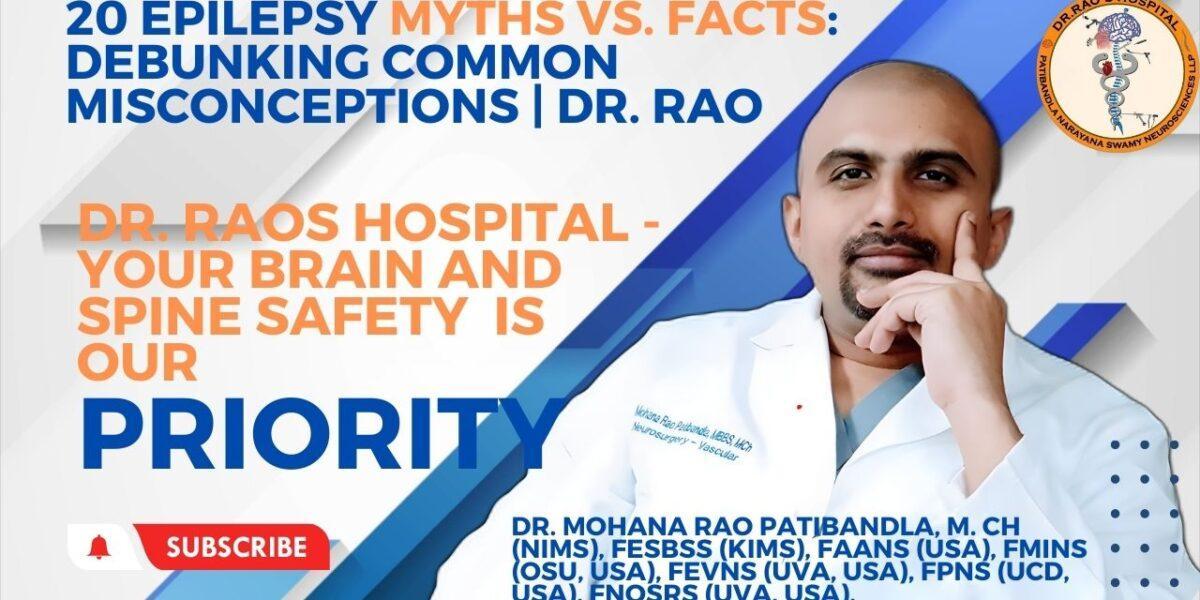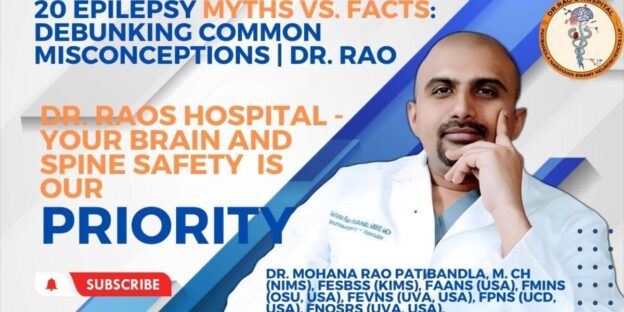Epilepsy Myths vs. Facts: Busting Common Misconceptions | Dr. Rao’s Hospital
20 Epilepsy Myths vs. Facts: Debunking Common Misconceptions
Summary: In this viral video, we delve into epilepsy and debunk 20 prevailing myths surrounding this neurological condition. Joined by Dr. Rao, the best neurosurgeon in India, we aim to educate and inform viewers about epilepsy management and challenge misconceptions. Join us as we break the barriers, promote awareness, and provide valuable insights into epilepsy. Discover the truth behind epilepsy and gain a deeper understanding of this condition that affects millions of lives.
Introduction:
Epilepsy is a neurological disorder that affects millions of people worldwide. Unfortunately, many myths and misconceptions surround epilepsy, leading to misunderstandings and stigmatization. In this blog, we aim to debunk 20 common myths about epilepsy and provide factual information to help increase understanding and awareness. We are joined by Dr. Rao, the best neurosurgeon in India, who has extensive experience treating epilepsy at Dr. Rao’s Hospital, the leading neurosurgery hospital in Guntur and India.
Myth #1: Epilepsy is a mental illness.
Fact: Epilepsy is a neurological condition characterized by recurring seizures and is not a mental illness.
Myth #2: People with epilepsy are intellectually disabled.
Fact: Epilepsy does not directly affect intelligence, and many individuals with epilepsy have normal cognitive abilities.
Myth #3: Only children can develop epilepsy.
Fact: Epilepsy can develop at any age, from infancy to adulthood.
Myth #4: Epilepsy is contagious.
Fact: Epilepsy is not contagious and cannot be transmitted from person to person.
Myth #5: All seizures are the same.
Fact: There are different types of seizures, including focal seizures, generalized seizures, and absence seizures, each with unique characteristics.
Myth #6: People with epilepsy should avoid physical activities.
Fact: With proper management and guidance from healthcare professionals, individuals with epilepsy can engage in various physical activities.
Myth #7: Epilepsy can be cured by herbal remedies or alternative therapies.
Fact: While complementary therapies may help manage epilepsy symptoms, there is no known cure for epilepsy. Medical treatment is essential.
Myth #8: Seizures always involve convulsions.
Fact: Seizures can manifest in different ways, including convulsions, but they can also involve subtle movements or alterations in consciousness.
Myth #9: Epilepsy is always caused by head injuries.
Fact: While head injuries can cause epilepsy, there are various other factors, including genetics, brain infections, and structural abnormalities.
Myth #10: Women with epilepsy cannot get pregnant.
Fact: With proper medical care and guidance, many women with epilepsy can have healthy pregnancies and give birth to healthy babies.
Myth #11: Epilepsy is a life-threatening condition.
Fact: While seizures can be dangerous in certain situations, most people with epilepsy lead everyday lives with proper treatment and management.
Myth #12: Individuals with epilepsy cannot work or have a successful career.
Fact: With appropriate medical treatment and accommodations, individuals with epilepsy can pursue fulfilling careers and achieve professional success.
Myth #13: Epilepsy medications always have severe side effects.
Fact: While some epilepsy medications may have side effects, various treatment options are available, and not all medications cause significant side effects.
Myth #14: You should restrain someone having a seizure.
Fact: It is essential to create a safe environment during a seizure by removing objects that could cause harm, but restraining the person is unnecessary and may cause injury.
Myth #15: People with epilepsy should avoid bright lights or flashing images.
Fact: Photosensitivity is a specific trigger for some individuals with epilepsy, but it does not apply to everyone. Each person may have unique triggers.
Myth #16: Epilepsy is a sign of low intelligence.
Fact: Epilepsy does not affect intelligence, and individuals with epilepsy can excel academically and professionally.
Myth #17: Epilepsy is caused by demonic possession or supernatural forces.
Fact: Epilepsy is a medical condition with neurological origins and has no connection to supernatural or demonic influences.
Myth #18: Seizures can be stopped by putting something in a person’s mouth.
Fact: Placing objects in someone’s mouth during a seizure can cause injury. Turning the person on their side is best to prevent choking and provide a safe environment.
Myth #19: People with epilepsy cannot live independently.
Fact: With proper management and support, many individuals with epilepsy live independently and lead fulfilling lives.
Myth #20: Epilepsy is untreatable.
Fact: Epilepsy can often be effectively managed with medications, surgical interventions, and other treatment options, allowing individuals to live seizure-free or with reduced seizure frequency.
Conclusion:
By debunking these 20 epilepsy myths and providing accurate information, we hope to promote understanding and awareness about epilepsy. Remember, knowledge is power, and with the proper knowledge, we can challenge misconceptions, support individuals with epilepsy, and create a more inclusive society. If you or a loved one is affected by epilepsy, consult Dr. Rao, the best neurosurgeon in India, at Dr. Rao’s Hospital for comprehensive care and support. Contact us at 9010056444 or visit our website at drraoshospitals to learn more about our services. Together, let’s break the barriers surrounding epilepsy and create a more informed and compassionate world.
Tags: epilepsy, epilepsy myths, epilepsy facts, epilepsy awareness, epilepsy management, neurosurgery, Dr. Rao, Dr. Rao’s Hospital, Guntur, India, neurological disorders, debunking misconceptions, epilepsy treatment, epilepsy care


